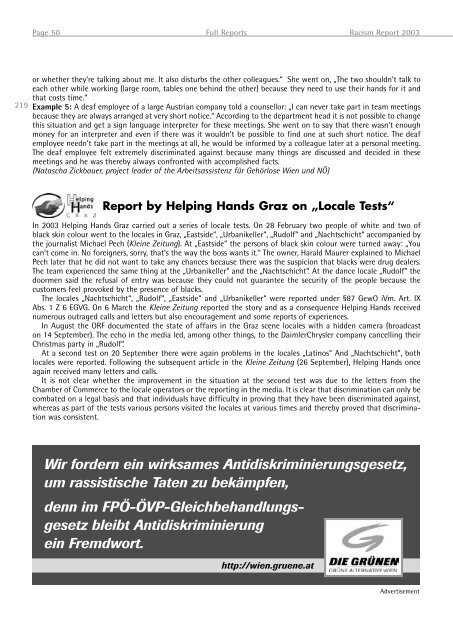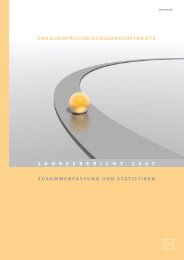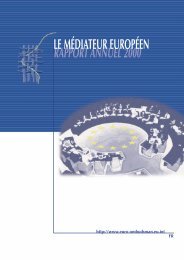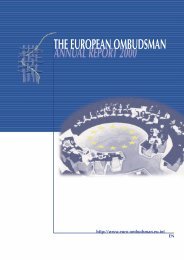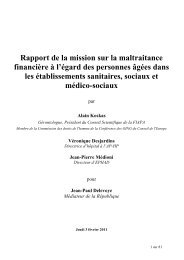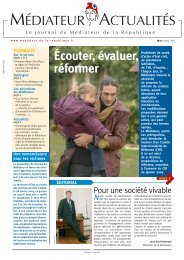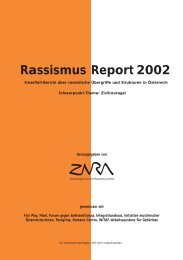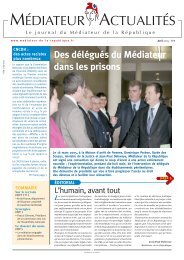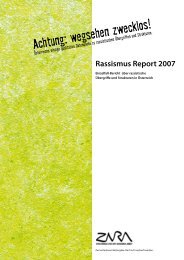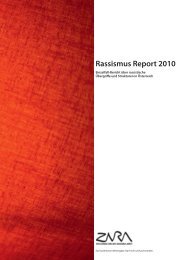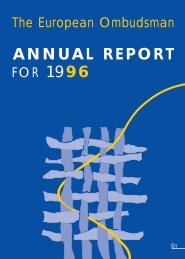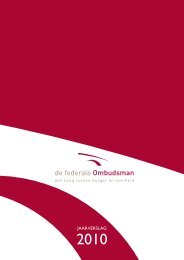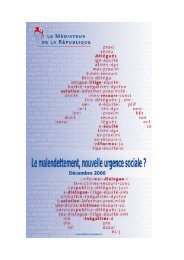Racism Report 2003 - Zara
Racism Report 2003 - Zara
Racism Report 2003 - Zara
Create successful ePaper yourself
Turn your PDF publications into a flip-book with our unique Google optimized e-Paper software.
Page 50 Full <strong>Report</strong>s <strong>Racism</strong> <strong>Report</strong> <strong>2003</strong>219or whether they‘re talking about me. It also disturbs the other colleagues.“ She went on, „The two shouldn‘t talk toeach other while working (large room, tables one behind the other) because they need to use their hands for it andthat costs time.“Example 5: A deaf employee of a large Austrian company told a counsellor: „I can never take part in team meetingsbecause they are always arranged at very short notice.“ According to the department head it is not possible to changethis situation and get a sign language interpreter for these meetings. She went on to say that there wasn‘t enoughmoney for an interpreter and even if there was it wouldn‘t be possible to find one at such short notice. The deafemployee needn‘t take part in the meetings at all, he would be informed by a colleague later at a personal meeting.The deaf employee felt extremely discriminated against because many things are discussed and decided in thesemeetings and he was thereby always confronted with accomplished facts.(Natascha Zickbauer, project leader of the Arbeitsassistenz für Gehörlose Wien und NÖ)<strong>Report</strong> by Helping Hands Graz on „Locale Tests“In <strong>2003</strong> Helping Hands Graz carried out a series of locale tests. On 28 February two people of white and two ofblack skin colour went to the locales in Graz, „Eastside“, „Urbanikeller“, „Rudolf“ and „Nachtschicht“ accompanied bythe journalist Michael Pech (Kleine Zeitung). At „Eastside“ the persons of black skin colour were turned away: „Youcan‘t come in. No foreigners, sorry, that‘s the way the boss wants it.“ The owner, Harald Maurer explained to MichaelPech later that he did not want to take any chances because there was the suspicion that blacks were drug dealers.The team experienced the same thing at the „Urbanikeller“ and the „Nachtschicht“. At the dance locale „Rudolf“ thedoormen said the refusal of entry was because they could not guarantee the security of the people because thecustomers feel provoked by the presence of blacks.The locales „Nachtschicht“, „Rudolf“, „Eastside“ and „Urbanikeller“ were reported under §87 GewO iVm. Art. IXAbs. 1 Z 6 EGVG. On 6 March the Kleine Zeitung reported the story and as a consequence Helping Hands receivednumerous outraged calls and letters but also encouragement and some reports of experiences.In August the ORF documented the state of affairs in the Graz scene locales with a hidden camera (broadcaston 14 September). The echo in the media led, among other things, to the DaimlerChrysler company cancelling theirChristmas party in „Rudolf“.At a second test on 20 September there were again problems in the locales „Latinos“ And „Nachtschicht“, bothlocales were reported. Following the subsequent article in the Kleine Zeitung (26 September), Helping Hands onceagain received many letters and calls.It is not clear whether the improvement in the situation at the second test was due to the letters from theChamber of Commerce to the locale operators or the reporting in the media. It is clear that discrimination can only becombated on a legal basis and that individuals have difficulty in proving that they have been discriminated against,whereas as part of the tests various persons visited the locales at various times and thereby proved that discriminationwas consistent.Advertisement


